- Home
- Juliet Marillier
[Sevenwaters 04] Heir to Sevenwaters Page 2
[Sevenwaters 04] Heir to Sevenwaters Read online
Page 2
He was just as good-looking as I’d remembered: tall and broad-shouldered, with a strong-boned face, well-kept brown hair and friendly eyes. He was by far the most handsome of all Johnny’s men, I thought; at least, all of them whom I’d met. My cousin was a leader of elite warriors. He ran an establishment that offered training in all aspects of combat, and his personal guards were the best of the best. As my father’s heir, Johnny spent part of every year with us at Sevenwaters and always brought a complement of five or six guards with him. The other man was staring at me. I must answer Aidan’s question. I opened my mouth to do so, but the dark man spoke first.
“This has to be one of Johnny’s multiplicity of female cousins—the blinding red of that hair confirms it. Now, which one is it? Not the baby; not the seer; not the eldest, whom we already know. And the crippled one’s at Harrowfield. This can’t possibly be the young lady getting married tomorrow. I deduce it’s the one you’ve mentioned more times than is altogether appropriate, Aidan. What did you say she had a talent for? Oh, that’s right, housewifely skills, washing and cooking, that kind of thing.” He gave an ostentatious yawn. “Forgive me, but I can’t imagine anything more boring.”
He might as well have smacked me in the face. I struggled for a response.
“Cathal!” Aidan had flushed scarlet. “Please ignore my friend,” he added, turning toward me. “I keep trying to train him in the social niceties but thus far he’s failed to grasp them.”
“We’re warriors, not courtiers.” Cathal spoke with studied weariness. “One doesn’t need social niceties on the battlefield.”
“You’re not on the battlefield, you’re a guest in the home of a respected chieftain,” I snapped, unable to control my annoyance. “We do maintain a basic level of good manners here. Perhaps my cousin was so busy giving you a run-down of our personal characteristics that he neglected to mention that.”
Cathal looked through me.
“Clodagh, I’m mortified by my friend’s rudeness,” Aidan said, offering me his arm. “His name is Cathal and, like me, he’s from Whiteshore. Johnny left him back on the island last year, and perhaps that’s where he should have stayed. We’re so sorry if we’ve upset you.”
“Speak for yourself,” said Cathal.
I wasn’t sure I wanted to introduce myself to such a disagreeable individual, but I was the daughter of the house, and if this was Aidan’s friend, unlikely as that seemed, I had better at least go through the motions. “I’m Clodagh, third daughter of Lord Sean and Lady Aisling,” I said tightly. “Welcome to Sevenwaters. I’m surprised to see you down here.” The lake shore was at some distance from the keep, at the foot of a sloping sward with the forest to either side. If they’d only just arrived, they should surely have been unpacking gear and settling in.
“Cathal wanted to walk by the water,” Aidan said. “You’re still looking upset, Clodagh. I assure you, Johnny speaks nothing but good of you and your sisters, and we’re fully conversant with the rules of Lord Sean’s household. I apologize on Cathal’s behalf for his ill-considered words. It’s all sound and no substance with him.”
“Such a comment seems somehow inappropriate from a bard,” Cathal said, gazing out across the lake as if he were not even marginally interested in the conversation.
Last spring and summer Aidan had once or twice been persuaded by his fellow warriors to play the harp for us after supper. He was a talented musician, which had struck me as surprising. Johnny’s men were fighters by profession. The essence of a bard’s art was creation, a warrior’s destruction. It seemed to me that doing both might leave a man’s mind full of conflicting questions.
“I hope you’ll play for us again while you’re here,” I said.
Aidan smiled, revealing the dimple at the corner of his mouth. “Only if you play too,” he said, brown eyes dancing.
“I might,” I said, thinking of all the reasons why I had so looked forward to his return and deciding that his presence at Sevenwaters would, on balance, outweigh that of the obnoxious Cathal. “My sister’s betrothed, Illann, has arranged for musicians to come from his own household for the celebrations. But I imagine you’re here for a while; there should be plenty of opportunity.”
“If you look at Aidan like that, he’ll certainly perform for you,” Cathal said. “He’s all too ready to woo likely women with a well-crafted love song or two. Just don’t take him seriously, that’s my advice.”
“In the unlikely event that I think your advice may be useful, I’ll ask you for it,” I said in what I hoped was a quelling tone. “And you can keep your personal remarks about my sisters to yourself. If I hear such comments from you again I’ll . . .”
“You’ll what?” His brows arched. “Tell your father? Slap me on the cheek? Run off and cry?”
“Stop it, Cathal!” Aidan looked mortified. “He doesn’t mean a word of it, Clodagh. Now, may we escort you back to the house?”
“In a moment,” I said, then turned back toward Cathal. “I’ll ask Johnny to send you away immediately,” I told him, though I knew I could not actually expect my cousin to accommodate such a request. There were always strategic reasons for the deployment of his men. That applied even if they were accompanying him to a family wedding. “I know what high standards he sets for his personal retainers. It’s not just skill in weapons or tracking or observation. It’s the way you live your whole life. If you’re as rude as this to everyone, I can’t imagine why he’s kept you. You must have some quality that’s completely invisible to an outsider such as myself.”
I expected a barbed retort, but Cathal simply shrugged. As we walked back to the keep and Aidan engaged me in a conversation about music, his friend fell into a deep silence.
Deirdre was in the chamber the two of us had shared since we were little girls. Although our house was a keep, its interior was comfortably fitted out, with many private rooms. Sibeal and Eilis shared the bedchamber next door. After tomorrow I’d have this one all to myself.
My twin was sitting on her bed, her head in her hands, crying. She’d been absolutely right about her hair. She and I had inherited our mother’s flaming curls, which could be striking if tended with care, but had a tendency to go wild at the least provocation. I could see that the chamomile had not been a good idea.
Deirdre sobbed out something about Illann thinking she was ugly and deciding he didn’t want to marry her after all, which I took to be her worst fear about tomorrow.
“Nonsense,” I said, sitting down beside her and putting my arm around her shoulders. “We have almost a whole day before the hand-fasting. There’s plenty of time to fix your hair.” The long list of other things I had to do flashed through my mind, but for the moment I ignored it. “A sprinkle of lavender water, some careful plaiting, that’s all it needs.”
“We don’t have a whole day,” Deirdre pointed out. “There’s the feast tonight, and the dancing. And now Johnny’s here . . .”
Perhaps the tears were not all related to her appearance. Deirdre did tend to make everything into a drama, but she was genuinely upset.
“Deirdre,” I said firmly, “come and sit by the mirror. The sooner I start working on your hair, the likelier it is you can be your beautiful self for tonight’s festivities.”
“I can’t possibly make an appearance for the feast,” Deirdre muttered as she settled before the mirror. She pinched her cheeks in an attempt to redden them. “I look completely washed out. I should never have chosen green for the wedding gown. I wonder if it’s too late to—”
“Morrigan’s curse!” I exclaimed in horror, catching sight of myself in the bronze mirror over my sister’s shoulder. Cathal’s comment about my obviously not being a bride made complete sense now. My hair was even frizzier than Deirdre’s and had leaves and twigs in it. After my headlong sprint in the cold, my cheeks wore the flush my sister was aiming for. My eyes were red too, and so was the tip of my nose. The rent in my gown showed not only my grazed knee but also a considerable lengt
h of leg. It was no wonder Aidan had given me a funny look as I came out of the forest.
“What?” demanded Deirdre, diverted from her woes. “What’s wrong?”
“Nothing,” I growled as I used the comb to separate my sister’s hair into sections. It would take a great deal of work to get her mop under control, but then I’d had plenty of practice. “Unless you count the fact that I just bumped into Aidan looking like this.” He and Cathal were probably laughing about it together right now.
“Oh, so Johnny did bring him again? That’s wonderful news, Clodagh. I know how much you like him. I bet Aidan asked if he could come. He seemed quite keen on you last year. And he’s so suitable. I mean, Aidan doesn’t quite have the pedigree that Illann does, but he is a chieftain’s son, and I know Father would like an alliance in the west. Just think, Clodagh, we could both be married in the same year!”
“Aidan may be suitable husband material,” I said grimly as I pinned up a strand of Deirdre’s hair, “but I won’t be marrying him any time soon. Or anyone, for that matter.” For a moment I had basked in my memories of last year, when Aidan had walked in the garden with me and played the harp with me and generally gone out of his way to talk to me. That had been before Mother conceived her child. Now everything was different, and it didn’t matter whether I liked Aidan or he liked me, because I knew I would not be free to marry for a long time, if ever. “I’ll have to stay here, Deirdre, you know that. Even if everything goes well for Mother, she’ll be weak and tired for a while. She’ll need me. And if things go wrong . . .” There was no need to spell it out. “Never mind,” I said with forced cheerfulness. “I’ve certainly wrecked my chances of making a good impression on Aidan today, anyway. He had the most awful friend with him. The rudest man I’ve ever had the misfortune to clap eyes on. I can’t imagine where Johnny got him from. He must be losing his touch.”
Something had changed in Deirdre’s expression. I met her eyes in the mirror. “You can’t have been crying just about your hair,” I said. “What’s really wrong? Is this about Johnny?” This was a topic on which even I had to tread warily.
“Why would it be?” Deirdre’s response was a little too quick.
“You know why, Deirdre. For years and years there’s only been one man you liked, and it wasn’t Illann. The fact that first cousins can’t marry doesn’t even come into it. It wouldn’t be fair to Illann if you took him as second best.”
“That was ages ago. I was a child. You don’t imagine I’ve been harboring a secret passion for Johnny all these years, do you?”
I knew that was exactly what she had been doing, but I would not upset her further by saying so. I pinned up the last section of her hair before starting to comb and plait. “Are you feeling nervous then? About . . . well, about the wedding night and all that?”
“A bit,” Deirdre said. “Ouch, that hurts, Clodagh! But not nervous enough to cry over it. It’s not as if Illann and I haven’t . . . That is to say, there have been certain things . . . I’m pretty sure I’ll like it, once I get used to it.”
“You’re lucky,” I said, combing steadily. “The most advantageous marriage Father could ever have dreamed of for one of his daughters, and you actually like Illann enough to want to share his bed.”
“Your time will come.”
“I expect Father will choose some ghastly old man for me, someone who happens to be useful as an ally.” As an attempt at humor, it sounded unconvincing even to me.
“He wouldn’t do that, Clodagh,” Deirdre said seriously. “You know he wouldn’t have insisted on my match with Illann if I didn’t like him. And given what Illann’s connections can do for Father, that was remarkably good of him.”
“True.” I didn’t think Father would be needing to deal with prospective suitors for me. Whatever happened when Mother gave birth, she would not be able to resume her duties around the house for a while. If the worst occurred, I must be prepared to take on the domestic management of Sevenwaters for my father’s lifetime. Although I was one of six daughters, there was no doubt that this particular job would fall to me.
My eldest sister Muirrin was married and lived at Inis Eala, headquarters of Johnny’s warrior band. Deirdre would be hand-fasted and gone tomorrow. Our next sister, Maeve, had suffered severe injuries in a fire four years ago and now lived in my aunt’s house in Britain. Aunt Liadan, Johnny’s mother, was a healer of unparalleled skills. If anyone could help Maeve regain movement in her poor twisted hands and come to acceptance of her scarred face, Liadan could. Cathal had been right: my sister was a cripple. But none of our family ever used that ugly word.
As for my two youngest sisters, Sibeal was a scholar and a seer, destined for higher things, and Eilis was only nine. Mother had been training Deirdre and me for years in the expectation that each of us would marry and need to perform these duties capably in our husbands’ households.
“What’s the matter, Clodagh?” Deirdre’s gaze sharpened as she watched me in the mirror. “You look sad suddenly.”
“I’m going to miss you so much,” I said. “Thank goodness we’ll still be able to talk to each other when you’re gone. I don’t know how I’d manage without that. I mean, you’ve always been here. It’s like part of myself going away.”
Deirdre said nothing.
“You’ll want to know what happens when Mother has the baby,” I went on. “I’ll be able to tell you straightaway.” That wouldn’t be easy if Mother and the child both died. My mental link with my twin meant news was delivered rather baldly, without the possibility of asking a third person to be present, or getting the recipient seated, or ensuring privacy before coming right out with it.
“She’s going to die, isn’t she?” Deirdre’s voice was oddly flat now. “After tomorrow, I’ll never see her again.”
My own eyes stung in sympathy. We hadn’t talked about this, not properly. We’d skated over the surface of it rather than admit to ourselves, or to each other, what we knew was most likely to happen. “She might get through it,” I said. “The baby might survive too. Mother certainly believes that.”
Deirdre had bowed her head. Her hands were tightly clasped in her lap. She did not speak.
“Maybe Illann could bring you back to visit before the baby’s due,” I said, putting down the comb. How terrible for my twin if what she had said came true, and she never got the chance to say goodbye.
“I don’t even want to think about it!” Deirdre snapped. My twin had always been volatile, her emotions as tumultuous as an autumn storm. I was the calm one; in general, I simply got on with what needed doing. “I hate the idea of being here when it happens,” my sister went on. “Just imagine seeing her die right in front of us and not being able to do anything about it. If she has a boy and it lives and she doesn’t, I’m going to hate that child more than anything in the world.” She was crying again, her face crumpling with miserable fury.
I hugged her, blinking hard. “That’s nonsense,” I told her, though I had felt something dark and cold pass over me as she spoke. “People never hate babies, they only have to look at them to love them. And Mother may not die. Perhaps she’s right about this child being a son and a special gift from the gods. Perhaps all those offerings have worked for her at last.”
“You don’t really believe that, Clodagh.” Deirdre glanced up and I met her eyes in the mirror. I was shocked at the look in them; it was almost hostile. “I meant what I said. If Mother dies, I never want to come back here. I’m going to put Sevenwaters behind me and concentrate on being the best wife to Illann that I can possibly be.”
I had thought I knew Deirdre better than anyone, but she had shocked me. The thought of her turning her back on Sevenwaters and her family hurt me. I could think of nothing to say, but I had the curious sensation that I had suddenly grown much older. I picked up the comb and set to work again. Neither of us could afford to appear before the rest of the household looking as if we’d been crying. Deirdre must shine at tonight’s feast and I
must put on a convincing pretense of happiness, for my father’s sake in particular.
As chieftain of Sevenwaters, Father was juggling a far more testing set of challenges than I was: not just Mother’s uncertain future and that of her unborn child, but the fact that Deirdre’s marriage was likely to create resentment amongst certain powerful leaders of the northern Uí Néill. They would at the very least be suspicious of this new tie between Sevenwaters and the southern branch of their feuding clan. On top of those things, disquieting rumors had been heard in the district. People had begun to blame the Fair Folk for stock losses, for accidental fires, for crop failures and storms, as if that wise and noble race had almost overnight become mischievous and meddling. Talk of that sort troubled Father, since our land had long provided a haven for the Tuatha De. It was no wonder he was looking so tired. Deirdre and I must smile and hold our heads high tonight. We must celebrate tomorrow’s hand-fasting with every appearance of joy and hope.
“Clodagh,” Deirdre said, “there’s something I have to tell you. You won’t like it.”
“Oh?”
“I’m really, really sorry about this, Clodagh. I know it’s going to make you unhappy, but I have to do it.”
I put the comb down, completely mystified. “Come on, out with it then,” I said. “Whatever it is, it can’t be as bad as all that.”
She dropped her gaze. “Clodagh, we can’t do it anymore. When I’m gone, when I’m at Illann’s. It won’t be appropriate.”
“Can’t do what?” I had no idea what she meant.
“Talk, the way we do. I’m so sorry, I’ll miss you terribly, but . . . Once I’m married, it would be—it wouldn’t feel right, Clodagh. Don’t look like that, it’s not the end of the world. Be practical about it. What if Illann and I were lying together and suddenly you were there between us? Not actually there, of course, but it would be the same. We just can’t do it anymore.”
Something cold and hard lodged itself in my chest. “You can’t mean that,” I whispered, knowing that she must or she would not have said it.

 Den of Wolves
Den of Wolves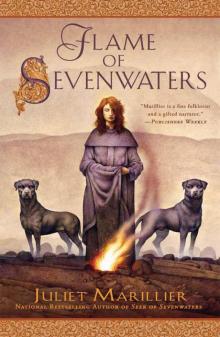 Flame of Sevenwaters
Flame of Sevenwaters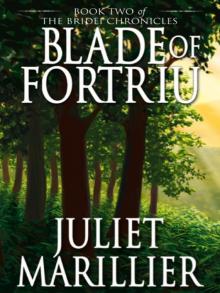 Blade of Fortriu
Blade of Fortriu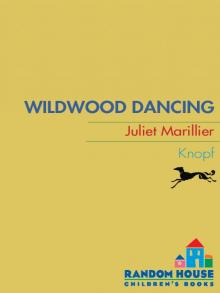 Wildwood Dancing
Wildwood Dancing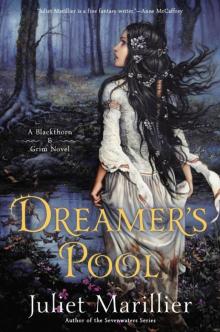 Dreamer's Pool
Dreamer's Pool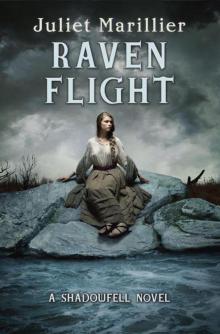 Raven Flight
Raven Flight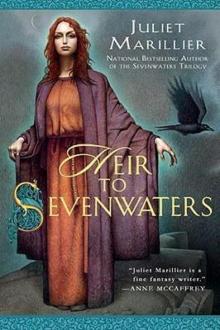 Heir to Sevenwaters
Heir to Sevenwaters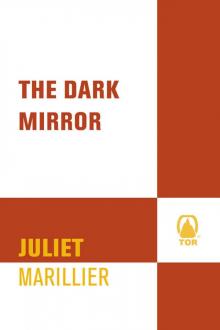 The Dark Mirror
The Dark Mirror Daughter of the Forest
Daughter of the Forest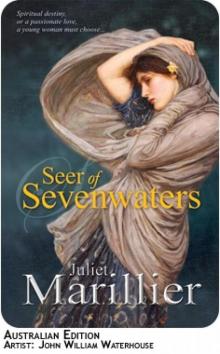 Seer of Sevenwaters
Seer of Sevenwaters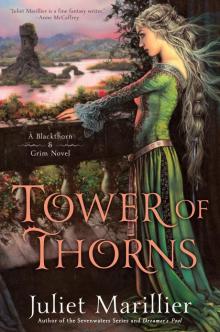 Tower of Thorns
Tower of Thorns Shadowfell
Shadowfell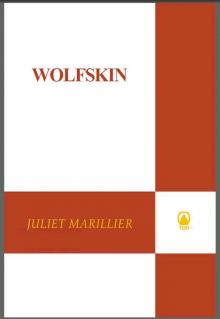 Wolfskin
Wolfskin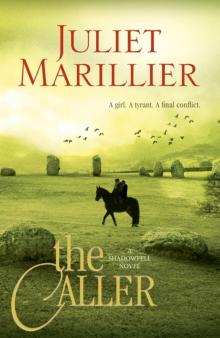 The Caller
The Caller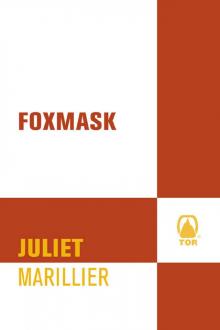 Foxmask
Foxmask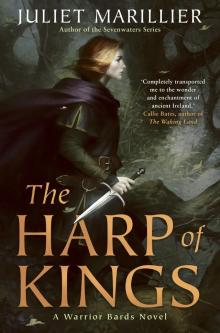 Harp of Kings
Harp of Kings The Well of Shades
The Well of Shades Heart's Blood
Heart's Blood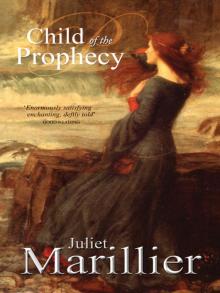 Child of the Prophecy
Child of the Prophecy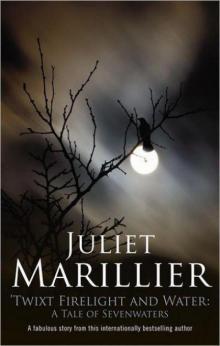 Twixt Firelight and Water
Twixt Firelight and Water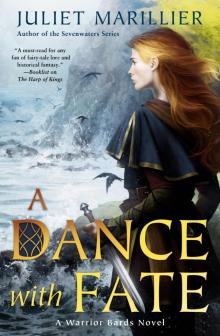 A Dance with Fate
A Dance with Fate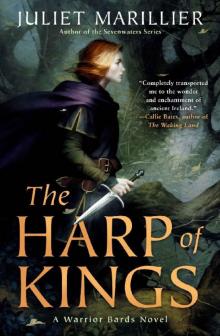 The Harp of Kings (Warrior Bards)
The Harp of Kings (Warrior Bards)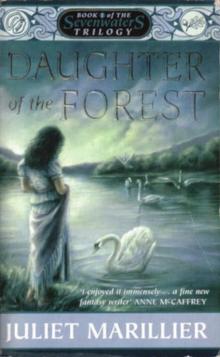 Daughter of the Forest (The Sevenwaters Trilogy)
Daughter of the Forest (The Sevenwaters Trilogy)![Sevenwaters [06] Flame of Sevenwaters Read online](http://i1.bookreadfree.com/i2/04/08/sevenwaters_06_flame_of_sevenwaters_preview.jpg) Sevenwaters [06] Flame of Sevenwaters
Sevenwaters [06] Flame of Sevenwaters![[Sevenwaters 04] Heir to Sevenwaters Read online](http://i1.bookreadfree.com/i2/04/12/sevenwaters_04_heir_to_sevenwaters_preview.jpg) [Sevenwaters 04] Heir to Sevenwaters
[Sevenwaters 04] Heir to Sevenwaters